The National Gender and Development Resource Program
The development of the Philippine Commission on Women (PCW) Strategic Plan 2013-2016 paved the way for conceptualizing the National Gender and Development Resource Program (NGRP) in 2013. The NGRP concept utilized the gains from the implementation of previous PCW programs such as the Gender and Development (GAD) Resource Center1 (1990s), the GAD Resource Network2 (2001), the GREAT Women Project 3 (2006-2013), and other similar undertakings.
Initially, the NGRP caters to the:
- delivery of technical assistance to requesting NGAs and LGUs for capacity development interventions on GAD;
- setting up mechanisms for the regular updating and sharing of information and resources as well as a referral mechanism for suitable resource persons, trainers, and other technical assistance providers on GAD;
- development and/or updating tools, learning materials, and other knowledge products on GAD and conduct of GAD researches.
Following its objectives, the original NGRP has three main components: Technical Assistance (TA) Packages, GAD Research and Learning Materials Development, and GAD Resource Pool.
In consideration of its mandate under the Magna Carta of Women (MCW), specifically in “ensuring that government agencies are capacitated on the effective implementation of the law,” the NGRP has steered the direction for PCW in addressing the increasing demand from government agencies on GAD mainstreaming. As an overall technical assistance blueprint of PCW, the NGRP is dedicated to providing timely, strategic, and appropriate technical assistance on GAD. It also establishes proper mechanisms to respond to the numerous requests for technical assistance on GAD, especially on GAD mainstreaming and GAD Planning and Budgeting (GPB).
The expansion of the Commission’s staffing pattern and restructuring of its existing divisions could be considered factors that guided PCW in terms of its GAD technical assistance services. This was made possible in 2016 when the Department of Budget and Management approved 21 new positions under the “Accelerating the Implementation of the Magna Carta of Women for Inclusive Development and Empowerment” or AIMWIDE.
The implementation of the NGRP, including its strategic interventions, indicators, targets to be pursued, and advisory and capacity-building services, is indicated in the PCW Strategic Plan 2017-2022. Moreover, the PCW was certified as ISO 9001-2015 compliant in December 2019, covering its three core processes, namely:
- relevant and responsive policy development;
- GAD plan and budget review and endorsement/acceptance; and
- provision of appropriate and strategic GAD TA i.e. responsive GAD TA and GAD information and referral services.
To satisfy the requirements of the ISO 9001-2015 standards, PCW developed a Quality Management Manual. The Manual sets out the standards for the provision of GAD-related technical assistance. These recent developments served as the bases for updating the existing functions of the NGRP.
Since its inception in 2013, the NGRP has resulted in numerous gains in terms of PCW’s efforts in assisting its stakeholders in their GAD mainstreaming journey, advancing the advocacy, and strengthening the implementation of MCW.
COMPONENTS
The updated NGRP has three main components for its operationalization:
- Development of GAD Tools, Learning Materials and Knowledge Products;
- Partnership Building in the Delivery of GAD TA; and
- GAD Technical Assistance Platform.
The first two components were adopted from the original NGRP concept. Because of emerging situations like the spread of COVID-19, there is a need to develop an online platform aside from the conduct of direct face-to-face technical assistance. This will minimize the transmission of the disease, hence, adjusting to the needed services of our clients.
Illustrated in Figure 1 are the three components of NGRP. These components are interrelated and interconnected regarding the development, partnership, and delivery of GAD technical assistance.
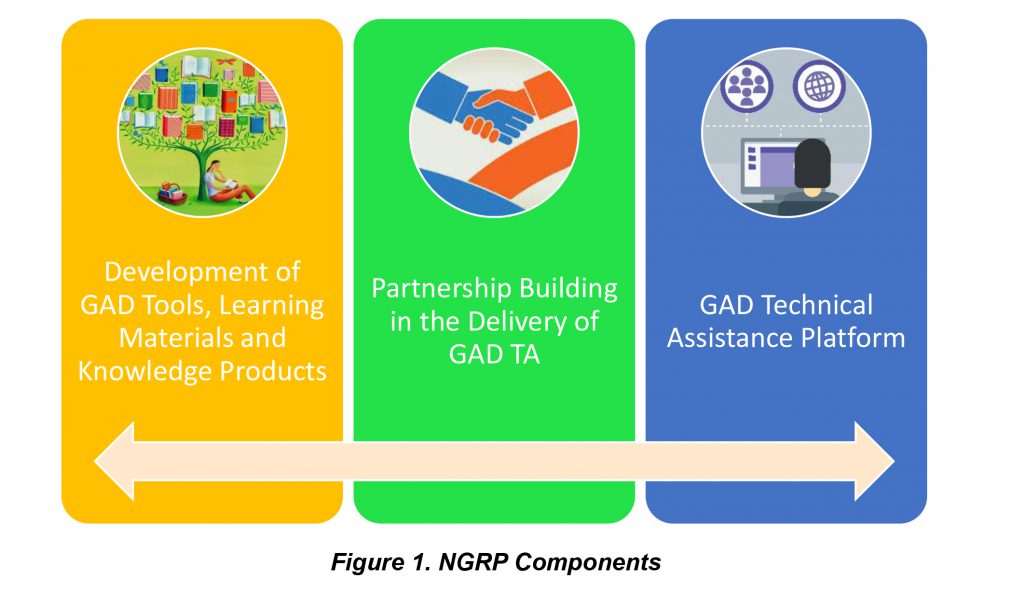
COMPONENT I
Development of GAD Tools, Learning Materials, and Knowledge Products
Component I of NGRP is focused on developing and enhancing GAD-related tools to further track the gender mainstreaming efforts of organizations. It aims to develop GAD learning materials to standardize the core messages in delivering GAD technical assistance. This component likewise strengthens the Commission’s GAD Knowledge Products to help its clients, specifically the policymakers and the members of the GAD Focal Point System of government agencies, develop a more profound understanding and appreciation of GAD mainstreaming.
The Technical Services and Regional Coordination Division (TSRCD) is the lead division of PCW in the provisioning of technical assistance. This Division also spearheads the development, reviewing, and updating of GAD tools, learning materials, and knowledge products. To achieve its functions, TSRCD employs different strategies and approaches such as desk review, consultation with PCW technical officers and sectoral experts, research on relevant GAD updates, and partnerships with other organizations to strengthen its knowledge base.
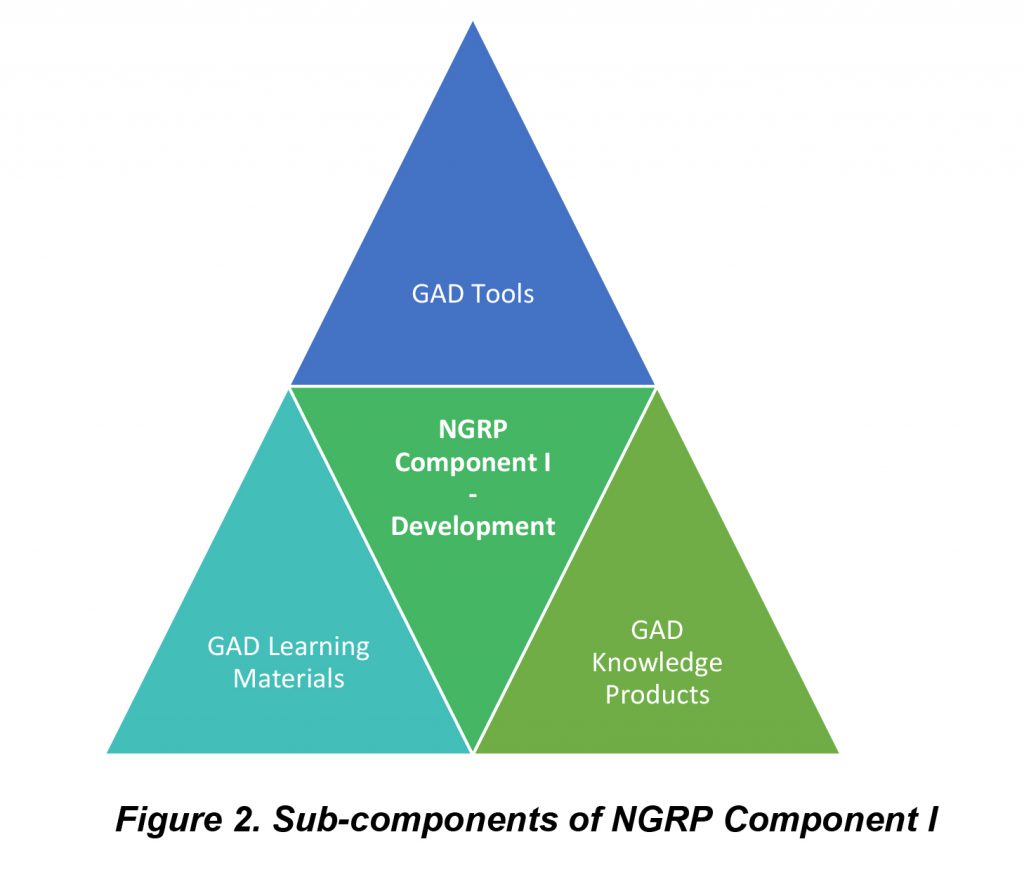
A. GAD Tools
GAD-specific tools are necessary to identify gender gaps in an agency in implementing its programs and projects. It also measures the success of their gender mainstreaming efforts. These tools aid the agencies, specifically the GAD Focal Point System members, in assessing their programs’ gender responsiveness and eventually make affirmative actions to achieve gender equality and women’s empowerment.
Over the years, several tools have been developed by PCW to gauge the mainstreaming activities and efforts of national government agencies and to assess the gender-responsiveness of its programs and projects, such as the Gender Mainstreaming Evaluation Framework (GMEF) and the Harmonized Gender and Development Guidelines (HGDG). International organizations have also developed toolkits that guide conceptualizing, designing, and evaluating programs and projects.
TSRCD ensures that insights and learnings from the past training will form part of the development and updating of GAD tools, modules, and other learning materials. PCW divisions, such as TSRCD and Sectoral Coordination Division (SCD), review and provide technical inputs on the HGDG sectoral checklists developed by different sectoral agencies. With its first-hand experience in reviewing and providing information and comments on the said checklist, inputs from the technical divisions/offices are deemed necessary in enhancing the tool. Furthermore, PCW GAD Resource Pool members may also be engaged to assist in crafting and updating the GAD tools and modules.
Being mandated to lead gender mainstreaming in the agency, the GFPS should be functional. As the main catalysts in their respective organizations, their roles and responsibilities are central to analyzing the gender issues faced by employees and their clients and identifying the necessary interventions. Under the GAD tool sub-component, PCW will develop a tool that will assess the functionality of the GFPS.
The GFPS Functionality Assessment tool will look into the following main areas:
- Structure and composition
- Fulfillment to the GFPS roles and functions based on its structure
- Core competencies of GFPS members
PCW and other institutions can also use the tool as an evaluation measure in providing awards and incentives to the highly functional GFPS.
The PCW shall also endeavor to organize an online collection of GAD tools. A dedicated section on this website, with complete background and explanation, will be created for stakeholders’ easy access and sharing.
B. GAD Modules
To be an effective learning provider, PCW will standardize its process of developing GAD training modules. The main building block of a specific training course or program, GAD modules, is built on a series of carefully designed learning experiences. A module should have clear learning objectives, relevant content, responsive methodologies and resources, and an assessment tool to gauge whether learning outcomes have been achieved. From time to time, the training provider must monitor and review the effectiveness of the training module to benchmark its success and determine the areas for improvement.
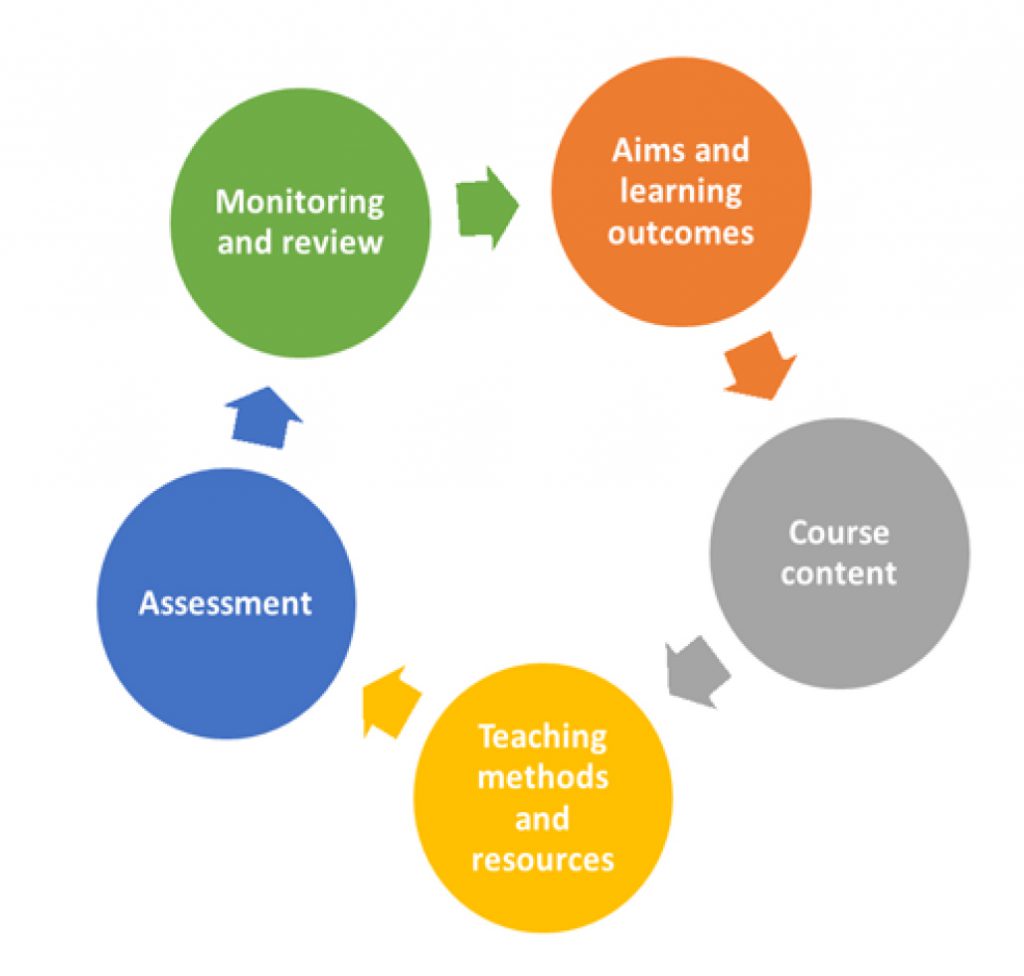
A context-specific GAD module is needed to amplify consistent GAD core messages and standards in providing GAD technical assistance. Through the years, PCW has developed GAD modules and housed some materials and documents that serve as references for updating and developing GAD modules.
The following are the basic and essential trainings needed by government agencies, particularly their GFPS members to mainstream gender perspective in their systems and processes:
- Gender Sensitivity Training
- Basic GAD Orientation
- Gender Analysis (GA) and Use of GA Tools
- GAD Planning and Budgeting
These GAD modules serve as the standards for GAD TA providers in conducting capacity development sessions for government agencies. Through these, it is ensured that appropriate information, core messages, and learning experiences are delivered to the Commission’s vast array of stakeholders. Ultimately, these modules enhance the awareness, knowledge, and capacities of agencies in mainstreaming gender perspectives and ensuring gender-responsiveness in the delivery of programs and projects of organizations.
C. GAD Knowledge Products
In recent decades, knowledge has become an essential asset for most organizations. In the quest to gain faster growth by using resources more efficiently, countries and businesses around the globe are driven by the generation and distribution of knowledge. This process has been accelerated by the information and communication technology (ICT) revolution, which dramatically increased the flow of information..4
As a learning institution on GAD, the PCW should strive to create, store, share, and use knowledge through an appropriate knowledge management (KM) system. To continue the knowledge-sharing aspect of a KM system in an organization, the present time entails a lot of investment in developing knowledge products (KPs). As defined by the Asian Development Bank, knowledge products are tangible outputs (e.g., publications and other products) of the development, sharing, or application of information and knowledge contents.5
The development of KPs in the NGRP will be categorized into two: internal and external. Internal KPs are classified as documents that can be shared internally with PCW, while external KPs are documents that can be shared with stakeholders of PCW.
The development of KPs will help achieve the overall objectives of the NGRP, as it will create more reference and learning materials deemed valuable in utilizing and sharing information on GAD. Accessing the KPs can be done online to limit face-to-face interaction. Learners also can learn at their own time and pace.
COMPONENT 2
Partnership Building in the Delivery of GAD TA
Since the establishment of the NGRP in 2014, PCW has certified 164 GAD experts as part of its NGRP. The certification of individual GAD practitioners has proven its relevance in helping PCW address the increasing demand of TA requests on GAD. Based on current trends, GAD training programs are popularly offered by academic and private training institutions.
As the lead agency on GAD, PCW should set the standards for GAD training programs offered by different institutions. This will ensure that the appropriate core messages are reflected and delivered to the stakeholders.
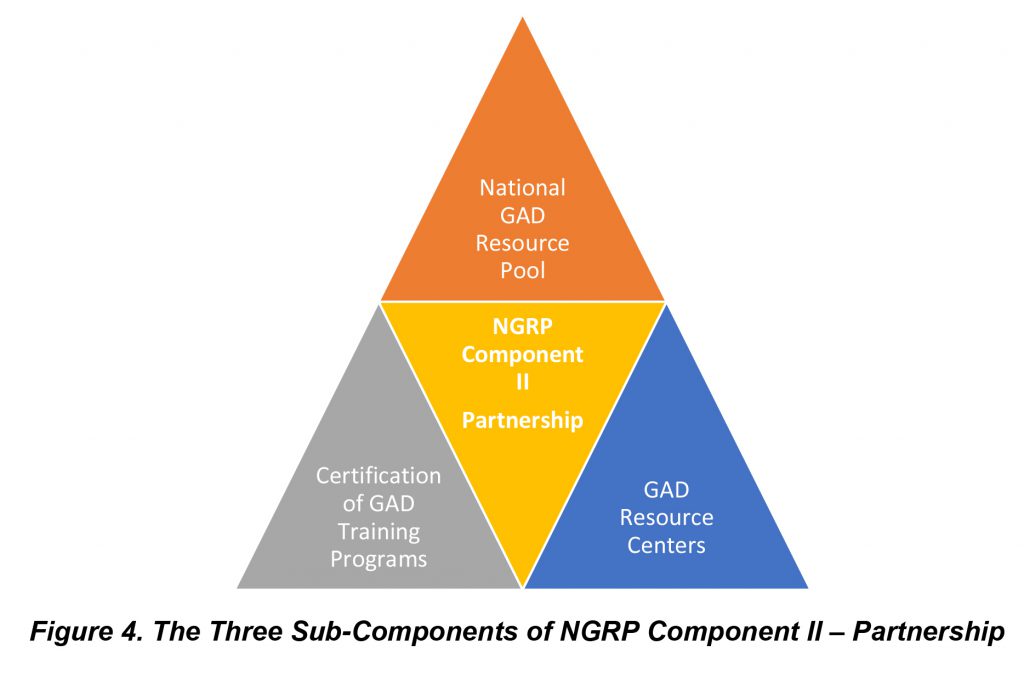
2.1. National GAD Resource Pool
Since PCW conceptualized the National Gender and Development Resource (GR) Pool in 2014, it has become a thriving community of GAD experts. It has significantly assisted PCW in providing GAD-related technical assistance to national government agencies and local government units.
Certified GR Pool Members are referred to requesting institutions when PCW staff cannot personally respond to client agencies’ concerns relative to their gender mainstreaming efforts. To date, PCW has certified seven batches of GR Pool with a total of 141 individual GAD experts from national government agencies, local government units, academe, civil society organizations, and independent consultants. Of the 141 experts, 115 are females, and 26 are males.
As part of their function, the GR Pool members were instrumental in drafting the GAD Resource Pool Handbook. This Handbook sets the standards, protocols, and procedures to guide PCW-certified GR Pool members in responding to TA requests, as well as in preparing the training reports and administering the evaluation forms. A Consultation Workshop of said Handbook was conducted by PCW in January 2015 and November 2018 and was attended by its GR Pool members.
To ensure that the GR Pool members are updated and capacitated on the most recent GAD developments, PCW organizes capacity development sessions exclusively for GR Pool members at least once a year. Since 2014, PCW has convened the GR Pool members into an assembly and engages with select members who will serve as facilitators, resource persons, and moderators.
2.2. Certification of GAD Training Programs
The increase in the demand for technical assistance on GAD mainstreaming is considered one of the results of PCW’s success in terms of its policy and advocacy programs. There are already several institutions now that offer GAD training programs. These institutions are public and private higher education institutions, government agencies with professional development institutes, and private organizations that cater to human resources and training management services. They offer training programs like Basic GAD Orientation, GAD Planning and Budgeting, and other sectoral GAD training.
These institutions’ emergence can be considered an advantage while posing issues and concerns. Through them, government agencies have other sources of assistance, enabling them to respond to their capacity development needs.
The PCW is studying the possibility of recognizing the training programs offered by these training institutions/providers to ensure the quality and alignment of core messages with that of the Commission.
2.3. GAD Resource Centers
In partnership with the Canadian International Development Authority, eight (8) GAD Resource Centers (GRCs) were established in 1997 under the Institutional Strengthening Project. These are:
- Pamulinawen (Region I)
- Urduja (Region I)
- Ugsad (Region VI)
- Sidlak (Region VII)
- Kadayao (Region VIII)
- Kasambohan (Region IX)
- Karamohan (Region X)
- Kalomonan (Region XI)
The GRC, a one-stop facility, provides technical and material resources that enable government agencies, academic institutions, people’s organizations, and development-oriented private organizations to mainstream GAD into their policies, structures, and programs. Said facility is a pool of highly trained and motivated gender trainers, researchers, and advocates from the academe, government, and non-government agencies. A total of 53 GRC members were trained under the Project.6
In line with the implementation of MCW, PCW aims to collaborate with GRCs in provisioning GAD-related technical assistance to regional line agencies and local government units. The Commission on Higher Education (CHED) Memorandum Order No. 1 series of 2015 or Establishing the Policies and Guidelines on GAD in the CHED and Higher Education Institutions (HEIs) specifies the oversight and monitoring functions of CHED to recognize and assess GRCs among HEIs with expertise in GAD.
In 2017, PCW conducted profiling of GRCs in public and private HEIs in the country. A total of thirty (30) HEIs (11 from Luzon, 13 from the Visayas, and six from Mindanao) have submitted their accomplished GRC profile forms.
COMPONENT 3
GAD Technical Assistance Platform
The NGRP is dedicated to providing national government agencies strategic, appropriate, and effective technical assistance. Capacity development interventions such as organizing GFPS assemblies and GAD Budget Fora are conducted to update the GFPS on the latest GAD policies and clarify issues on GPB and gender mainstreaming. To increase the reach of GAD technical assistance in far-flung areas of the country and to reduce the spread of covid-19 infection, an online platform will be used as it becomes more relevant to this pandemic.
3.1 Direct TA (Individual) and Organization of GAD Trainings (Sectoral and Public Offerings)
PCW and GAD Resource Pool provide GAD technical assistance by responding to individual requests from institutions. The bulk of requests is on training and resource persons, indicating that agencies are interested in learning and deepening their knowledge of GAD.
The conduct of GFPS Assemblies and the National GAD Budget Fora to capacitate agencies in mainstreaming gender and in developing their programs, projects, and activities will still be continued as they are venues where leveling off the roles and functions of GFPS members, sharing of experiences in the implementation of GAD programs, among others are discussed.
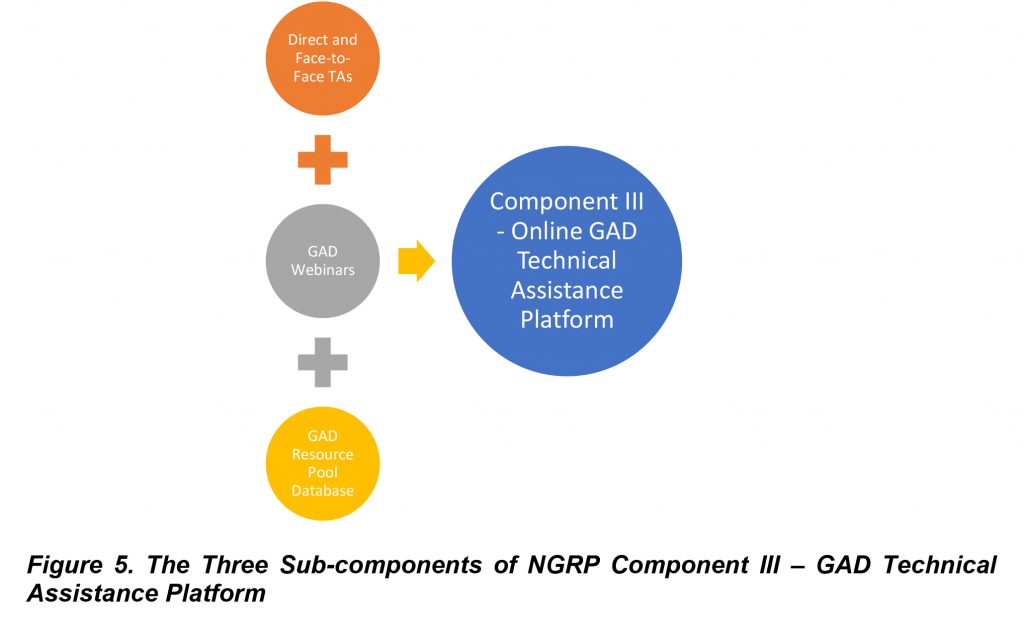
3.2 GAD Web-based Seminars (Webinars)
One of the visions of NGRP is to create an accessible, innovative, and informative platform to increase awareness and knowledge of policymakers, public officers, gender trainers, and even the public in gender mainstreaming.
The rapid advances in information and communication technology (ICT) provided many opportunities for instant access to information. Everything is now going digital and can be easily reached by our fingertips. ICT has dramatically influenced the shift of traditional learning forms to different types such as mobile, electronic, and digital learning.
The creation of the online GAD TA platform reduces the demand for face-to-face technical assistance given the current pandemic. It will also enable the learners to complete the modules at their own pace.
Webopedia7 defines a webinar as a presentation, lecture, workshop, or seminar transmitted over the Web using video conferencing software. The Webinar should be able to give, receive and discuss information in real-time.
The PCW, through its NGRP, will feature free online GAD courses that will capacitate agencies and individuals requesting for GAD-technical assistance, thereby reducing the need to conduct face-to-face capacity-building activities and reaching a wide array of audiences.
Meanwhile, the GAD webinars will also benefit the individuals, specifically the members of the GFPS of government agencies, as they can learn gender mainstreaming in their own time and pace. Moreover, GAD webinars are location flexible, allowing the learners to access the platform anytime and anywhere. It is also more efficient in sharing updates on the latest GAD policies and other HAD-related information among GAD practitioners and GAD Resource Pool.
References:
1 Created as a one-stop facility, the GAD Resource Center (GRC) provides both technical and material resources that enable government agencies, academic institutions, people’s organizations, and development-oriented private organizations, to mainstream GAD into their policies, structures and programs. As such, GRCs from regions 1, 8 and 10 were tapped by the PCW to implement the Institutional Strengthening Project funded by the Canadian International Development Agency (CIDA).
2 PCW initiated the creation of the GAD Resource Network (GRN) in 2001 to serve as its technical assistance arm. The GRN, composed of GAD advocates, is a pool of GAD practitioners from various sectors and disciplines grounded on feminist ethics, principles and values. It also includes members from the GRC.
3 Under the PCW -CIDA Gender Responsive Economic Actions for the Transformation of Women (GREAT Women) Project, a capacity building component was extensively implemented to raise the level of capacities of officials, staff of partner national government agencies and selected local government units. This initiative has promoted and supported a gender-responsive enabling environment for women’s economic empowerment.
4 Asian Development Bank. (2019, October 1). Knowledge Management in ADB. Retrieved here on April 29, 2020.
5 Special Evaluation Study Knowledge Products and Services. (n.d.). Retrieved here on April 29, 2020.
6 A Handbook for Establishing GAD Resource Centers (2005); UP Center for Women’s Studies (UCWS) and National Commission on the Role of Filipino Women (NCRFW)
7 Beal, V. (n.d.). webinar (Web-based seminar). Retrieved here on April 2, 2020.

